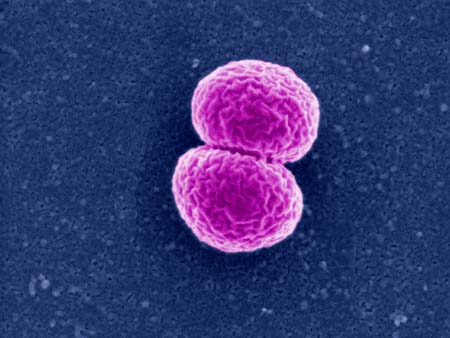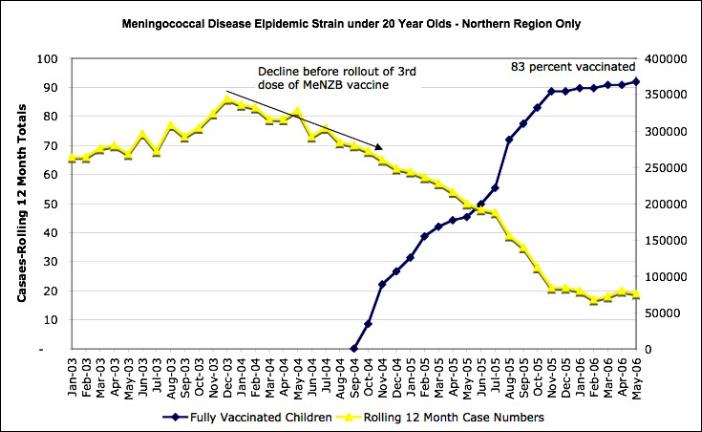There’s a big anti-vaccination movement around at the moment, and I think it’s ill-advised and extremely unhelpful to society.
I recently had a friend die of Meningococcal disease. Not a very close friend, to a person I know she was like a second daughter, well by analogy she was to me like a second cousin I saw at larger family gatherings.
However as she died at a ridiculously young age and was otherwise in good health, I found it somewhat disturbing and so started to research on this phantom menace disease. I knew little about it other than it must be one of those classes of disease which infect the dorsal cavity (the surrounding of which is called the meninges) which contain the spinal cord and brain.

Turns out, that there was a New Zealand epidemic of this disease caused by a bacterium - Neisseria meningitidis - which, according to the Wikipedia article on it, is found in 5-15% of adults. Quite how it goes from being apparently harmless flora in the throat to infecting the blood and meninges is still a mystery.
So this means that the disease can be controlled in two, perhaps three ways: firstly by controlling the spread of the flora by getting people to be more aware of things like sharing saliva and handwashing, to reduce the chances that you have any of the disease in your throat. Secondly, you can immunise, so that if the bacterium does get into your bloodstream, your immune system has a better chance to repel it in time. Lastly, anything to boost the general health of the immune system might help.

There are many groups of the disease, A, B, C, W135, X … most of these have simple, cheap polysaccharide vaccines and a new conjugate vaccine for type A has recently been developed. These are relatively low-cost and are used in African countries.
However the New Zealand outbreak was primarily group B. So, this requires a more technical counter where you basically have to strip the bacteria of their outer membrane vesicles, mix those outer bits with some adjuvant and a buffer solution, then dilute the whole lot in saline. When injected, it will usually stimulate the immune system into fighting an easy fight against the tiny pieces of the bacteria - an in doing so, tool them up to be able to fight the real thing should it ever have to.

Structure of the meningococcal cell wall. Capsular polysaccharides and outer membrane proteins are the target of ongoing vaccine research. (from chori.org)
It’s not 100%. Perhaps for practical reasons they had to select a single dominant strain. It can go wrong in a number of places. The immune system might not respond to the vaccine and so immunity might not be conferred. This is a common misunderstanding, people have this assumption that once you get the shot you are immunised for life and if you catch the disease then the immunisation must be a fraud.
Fighting epidemics is fighting statistics. It’s frustrating because it’s very hard to see if it worked, and if you are trying multiple approaches, which one was more effective. To get the most benefit, when there is an epidemic, you target the vulnerable group - in this case, people who are likely going to be swapping saliva with the most number of different partners intentionally or inadvertently - in this case, under 30’s.

That doesn’t mean that such statements imply that people who die of this dreadful disease were swapping saliva more than any other person. It doesn’t mean that when I call for wider immunisation that I am casting aspersions on the parents of my friend. She was immunised. Everyone says shining things about her.
What I’m calling for is co-operation with the medical field and people to stop passing around these poorly founded arguments against vaccinations, for it helps no-one to simply give up on one of our key approaches to combating epidemics.
In particular, if you are the sort of parent who chooses not to immunize, because of fears about a minor rash or because it’s not 100%, you are detracting from the value of the immunization programme. You are detracting far more than the share of the population represented, you include a percentage of the people they come into contact with. That’s the network effect in reverse. It gets shittier the more people who opt out.
I’m angry at the 17% of parents who said NO to the programme. I’m angry at the one third of NZ health professionals who think there is a link between Autism and MMR vaccine but are too lazy to research for the benefit of spreading better information. I’m angry at Sue Kedgeley for for supporting the anti-vaccination cause.
I guess my main point is that the argument against vaccinations that says that we shouldn’t immunise, because you know children need a few good diseases to harden themselves up, pretty much falls flat when those diseases cause sudden death. Worrying about vaccine side-effects or big pharma conspiracies is a First-World Problem, and acting on them has a cost in blood.